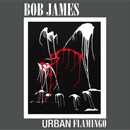 For Urban
Flamingo,
his first studio album in quite awhile, Bob James has gone
back to doing it the way he used to do it. While his
recent smooth/contemporary leaning projects have been collections
of slickly produced, tightly written songs, this one recalls
the sound of his great 70s and 80s recordings. Lengthy
tracks featuring lots of extended soloing that weaves in
and out of James’ trademark melody lines - catchy
songs and fragments that sound fresh and familiar at the
same time. That’s
what created the crossover appeal of signature releases like
the groundbreaking “Touchdown.” They lured “non-jazzers” into
listening to improvisational music because the framework
for the improvisation was so catchy. Over the years
he has tossed in a few songs like that between more radio
friendly fare. Now we get a whole CD. It’s
a brilliant, enjoyable, and very eclectic listening experience. For Urban
Flamingo,
his first studio album in quite awhile, Bob James has gone
back to doing it the way he used to do it. While his
recent smooth/contemporary leaning projects have been collections
of slickly produced, tightly written songs, this one recalls
the sound of his great 70s and 80s recordings. Lengthy
tracks featuring lots of extended soloing that weaves in
and out of James’ trademark melody lines - catchy
songs and fragments that sound fresh and familiar at the
same time. That’s
what created the crossover appeal of signature releases like
the groundbreaking “Touchdown.” They lured “non-jazzers” into
listening to improvisational music because the framework
for the improvisation was so catchy. Over the years
he has tossed in a few songs like that between more radio
friendly fare. Now we get a whole CD. It’s
a brilliant, enjoyable, and very eclectic listening experience.
Except for Earl Klugh and Fourplay band-mate
Nathan East, who are each featured on one song, the musicians
James has assembled for these sessions are Detroit-based
members of his touring band. They don’t have
the name recognition of the session heavy hitters you see
on most liner notes these days, and that works in their favor.
There is nothing imitative or formula-driven here. These
are seasoned, virtuoso players, and they tear it up. Sax
player David McMurray, who is best known for his work with
Was Not Was, has been touring with James for years. Guitarists
Perry Hughes and Wayne Gerard, drummer Ron Otis, and bassist
Al Wilson round out the Detroit gang. James Genus and Billy
Kilson, who played bass and drums on Take
it From The Top - the
2004 acoustic trio CD - also return to bring the jazz trio
setting to one beautiful track.
“Choose Me,” the opening track,
starts out sounding like a late 80s Sanborn song with McMurray
on alto sax playing a tight melody over a funky bass line.
Then it segues into a bluesy guitar solo from Hughes which
leads into some improvisation from James. McMurray
comes back in for another shot at the verse and bridge, then
just cuts loose and blows an avant-garde tinged solo over
percussive keyboard effects, all while the bass and drums
keep it tight and moving forward.
Clocking in at almost
nine minutes and delivering a whirlwind trip through such
a variety of styles all within the framework of intriguing
melodic fragments, this song is a preview of things to come. “Skidaway” starts
out loose and swingy with a sneaky sounding exchange between
keyboard and flute that surrounds guitar and sax solos, while
James adds some glistening keyboard textures to the background.
The title track starts out with a lyrical solo piano
passage, builds into a crescendo, then becomes subdued as
the setting for a Beck/Golub sounding fusion guitar solo from
Gerard. “Bobary
Coast,” sounds a bit like early Fourplay with a straight
ahead jazz break in the middle. “Wingapo,” is
an update on that original Tappan Zee sound. “Make
it More Blue” is
the most structured song, a seductive sax-driven ballad that
creates a mood rather than becoming the background for one.
"Fresh Start" reunites James and Klugh for a mid-tempo
romp, and “Niles Ahead” is an acoustic jazz piece
that provides a breezy contrast to “Choose Me.” The
shimmering keyboard chords and textures that are layered
into a lot of these songs, and the subtlety and speed of
some of the solos are something you need to experience with
headphones. On the other hand, watching one of the more exciting
March Madness games with the sound down and this music playing
the rhythms seemed to match the action on the screen. There
is so much going on musically that you can put it on and
experience it on a lot of different levels.
There are two vocals. “Lay Down
With You” features
Hilary James. She has a beautiful, expressive voice,
and the melody and instrumentation on this song mesh nicely
with the surrounding songs. “Endless Time” is
an R&B
ballad that would sound more in place on an Urban Adult Contemporary
project. It’s kind of pleasant but not a standout
track.
Listening to Urban Flamingo will
take long time fans back to the pre-smooth era, when songs
did clock in at six minutes or longer, and soloing wasn’t
verboten. For listeners who became smooth jazz fans
within the last ten years or so, as the music evolved from
being a genre to being a format, this is your chance to experience
what it can be when boundaries aren’t imposed and great
musicians just play!
- Shannon West
|

